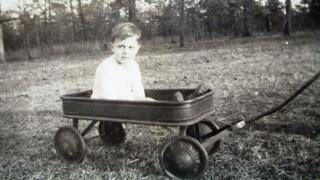Have you ever thought you were different or had people tell you you were different? Have you ever done things that seemed weird to others? As the first person diagnosed with autism, Donald Gray Triplett had these experiences. As a young child, his parents noticed he was highly intelligent, but also disconnected from the world. Donald always stayed to himself, and it seemed like he never wanted physical contact with other people. Mary and Oliver, his parents noticed that he could memorize bible verses and recite the alphabet in reverse order, but he always wanted to be alone. Donald’s rising behavior issues and his parents bewilderment on how to handle him led them to seek medical help.1
In August 1937, Donald’s doctor classified him as an overly stimulated child and suggested a change of environment would be helpful. At the age of three, Donald was institutionalized. Upon arrival, Donald was separated from his parents to live in a facility that was “not made for children like him in mind.”2 As a confused child, he did not know what was going on. All he knew was that he was taken from his home and being placed somewhere strange. Donald’s time in the facility weighed heavily on him, and he faded away physically. While waiting for Donald’s return, his parents did not receive any news of his condition improving; instead, he got worse and stayed confined to himself even more. As they gave up hope, his mother described him as a “hopelessly insane child.”3

Tired of waiting for Donald to miraculously get better, in August of 1938, his parents took him home. However, instead finding comfort, their sadness was only magnified by his behavior. Every day, all Donald wanted to do was spin his toys and watch with fascination the different musical notes, numbers, and pictures of the states. To Donald, this type of play was the only thing that mattered; his parents were just another part of the scenery. His father stated that he appeared to be oblivious to everything around him, like he was living in his own little world. It did not show any affection for his parents. Life for Donald and his parents was hard and it continued to get harder each day. His parents were at a loss and didn’t know what to do. Things got worse as Donald started throwing intense temper tantrums if his daily routine was disturbed. He became unresponsive, and if someone called his name or asked him a question, he would not answer or give one word answers. A highly intelligent boy, Donald had a lot of issues in expressing himself.4
In October 1938, frustrated with the digression of Donald’s behavior, his dad asked Dr. Kanner, a psychiatrist at John Hopkins Hospital, for help.5 Donald’s dad wrote the doctor a thirty-three page letter describing in detail every action and emotion Donald displayed.6 Dr. Kanner met Donald for the first time in Baltimore in 1938. He noticed that Donald did not acknowledge him but moved straight to the toys. This led him to try something different, something that might finally get Donald to react with some emotion. Dr. Kanner poked Donald with a pin to evaluate whether Donald showed any reaction toward the pain. Donald’s reaction was telling. Dr. Kanner could see that Donald did not like the pain, but he did not care any more or less for the doctor, because he was indifferent to what was going on. Dr. Kanner believed Donald could not attach the pain to the person who inflicted it. Throughout his visit with the doctor, Donald was indifferent to the doctor’s presence as if he was just furniture in the room. After two weeks, Dr. Kanner eliminated schizophrenia, a disorder he originally suspected Donald had. Finally, four years later, he wrote to Donald’s mother to inform her that Donald had autistic disturbance of affective contact.7 Nobody could to change the fact that Donald had this disorder. His autism led Donald to experience anxiety and sensitivity to sound, as well as to have learning disabilities. His actions and words were repetitive, and he had trouble understanding people’s emotions. The only option for Donald was to take it a day at a time as he found support through life’s challenges that came with this diagnosis.

Today, Donald leads a normal life coping with his autism. He lives alone in his childhood home. He still has issues socializing, but he came out of his shell to drive and golf. And, in 1957, he even pledged a fraternity, Lambda Chi Alpha, which surprised lots of people. Donald has traveled to 36 countries and 28 U.S states.8 Donald proved he would not let his autistic disorder keep him from living life. People with autism still face stigmas today. Donald stands as a hero, he faced numerous obstacles. Even while coping with autism, he was able to still live his life. Have you ever thought you were different or had people tell you, you were different? Have you ever done things that seemed weird to others? Everyone faces these questions in their life, and at some point, everyone can say that they have felt different before. Donald illustrates how to not let your difference define you. Any life is worth living no matter the difference and disorder.
- Kimberly Maich and Carmen L. Hall, Autism Spectrum Disorder in the Ontario Context: An Introduction (Toronto: Canadian Scholars Press, 2016). ↵
- John Donvan and Caren Zucker, “Autism’s First Child,” Atlantic 306, no. 3 (October 2010): 81-82. ↵
- John Donvan and Caren Zucker, “Autism’s First Child,” Atlantic 306, no. 3 (October 2010): 82. ↵
- Christine D. Shoop, “Examining Maternal Psychological Recollections of Children Diagnosed With Autism Spectrum Disorders,” PhD diss., Walden University, 2016, ↵
- Britannica Biographies Encyclopedia, 2012, s.v. “Triplett, Donald Gray,” by Richard Pallardy. ↵
- John Donvan and Caren Zucker, “Autism’s First Child,” Atlantic 306, no. 3 (October 2010): 85. ↵
- John Donvan and Caren Zucker, “Autism’s First Child,” Atlantic 306, no. 3 (October 2010): 85. ↵
- John Donvan and Caren Zucker, “Autism’s First Child,” Atlantic 306, no. 3 (October 2010): 88-89. ↵



49 comments
Sabrina Hsu
I was really surprised to hear that this only happened 1942. It really makes you wonder what people thought of the others before Donald who also had autism, and what happened to them. It’s sad that their first choice was to send Donald away, and that only made him worse, but no one had ever been diagnosed with autism before so there was no way of them knowing what was going on with him. I’m really glad Donald was able to keep fighting through all of it and is living a good life now.
Nathan Alba
I really like the overall message of this article. However it was unfortunate for Donald to grow up being different, he wouldn’t let it affect him. I guess we are all, in our own ways, much different from one another. But we should not let that dictate how we want to live our lives. Although Donald grew up being autistic, that doesn’t make him any less of a person than me or you. Can it be much more difficult to cope with? Probably most likely, but at the end of the day it is all about your attitude towards living your life that really matters.
Kathyleen Lauriano
It’s really interesting to read about the first autistic person. I have relatives that are diagnosed with autism and their all different. It must have been really hard for his parents to see him struggling. The fact that Donald didn’t let him being autistic affect him in the future shows you that he is very strong. Truly inspiring article, he overcame his disability and is enjoying his life.
Luisa Ortiz
I absolutely love this article, the storytelling, the details, the facts, the pictures! Thank you for bringing this story to the website and for telling Donald Gray’s story. I like how the story ended and how we were able to know what happens to Donald later on in life rather than just being the first kid to being diagnosed. I was truly moved by your article.
Nathalie Herrera
Donald Gray’s story is truly an inspiring one. Growing up for him in the social aspect was not easy at all, but he was still very intelligent. Although he has struggled and is still fighting his battles everyday, Gray is able to overcome this. He accepts who he is and allows himself to live his best life everyday. Very interesting and captivating article!
Jillian Pierucci
Nicely captured and explained, Antoinette. You open and closed with powerful words – reminding each of us to not be limited by a diagnosis rather to uniquely live our lives.
Eloisa Sanchez Urrea
Articles like these make me realize how complex the human body is. There are so many disorders and illnesses that we are just beginning to understand. This article did a good job of describing the obstacles Donald Gray Triplett had to face in being the first person diagnosed with Autism. I can only imagine how difficult this must have been when nobody else knew of this disorder and especially when it was dealing with a child.
Gabriela Ochoa
This was a really great article, it gave a great description on Donald and how his disorder didn’t affect his life. In my life I have known people with autism and have watched them do similar things to Donald. I do understand the confusion that is parents went through to not know why their son won’t connect with them. I’m glad that a doctor was able to actually diagnosis him and that he is living a great life.
Brianna Ford
This is such an amazing article, It is interesting to hear about the first person with autism. However, I could not imagine how absolutely heartbreaking It was for Donald’s parents to see their son struggle in his every day life. Not being social and had no feelings I know how frustrating it could have been for his parents. I am just glad that Donald was able to over come this adversity and now enjoys just being him. This was an inspiring article.
Rebecca Campos
The author did a great job writing this article. The article really makes the reader feel the frustration that Donald probably had since no one understood his frustration. His behavior was no fault of his own and its unfortunate that initially it was believed to be entirely on him. I found it very interesting that later on in life he ended up pledging to a fraternity. Donald’s childhood was anything but easy, but had it not been for him being the first diagnosed Autistic patient, we would not know what we do today about Autism and we would not be able to properly help future patients.